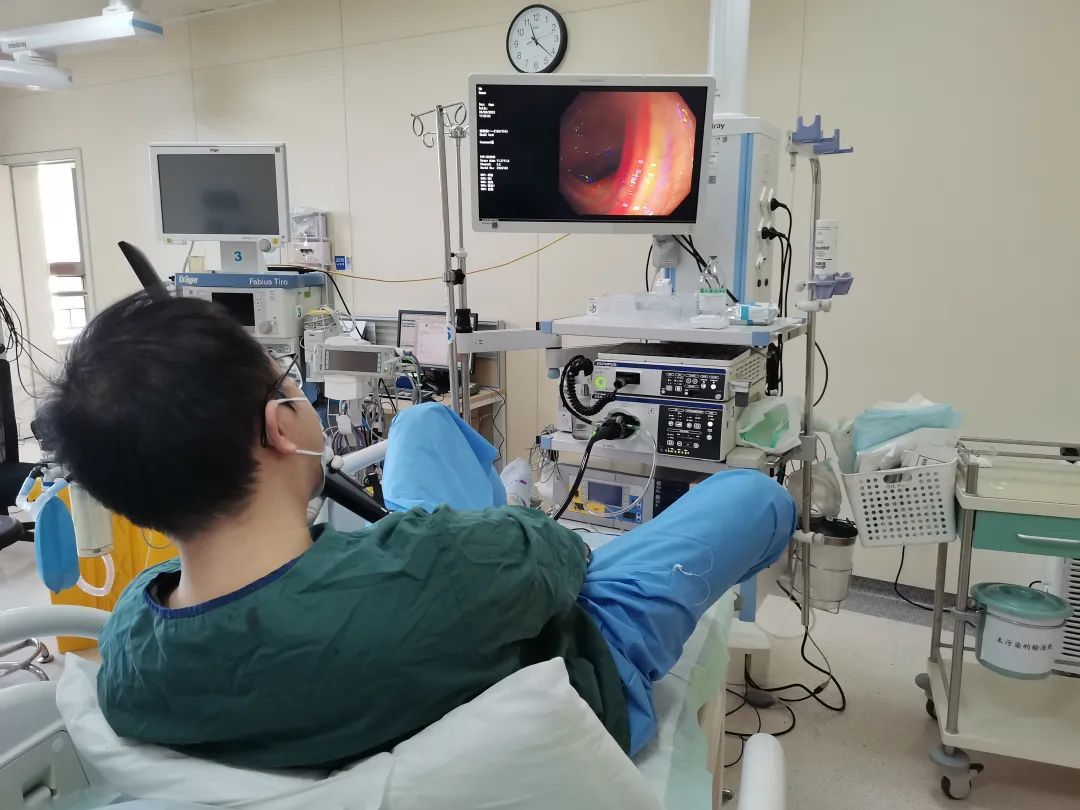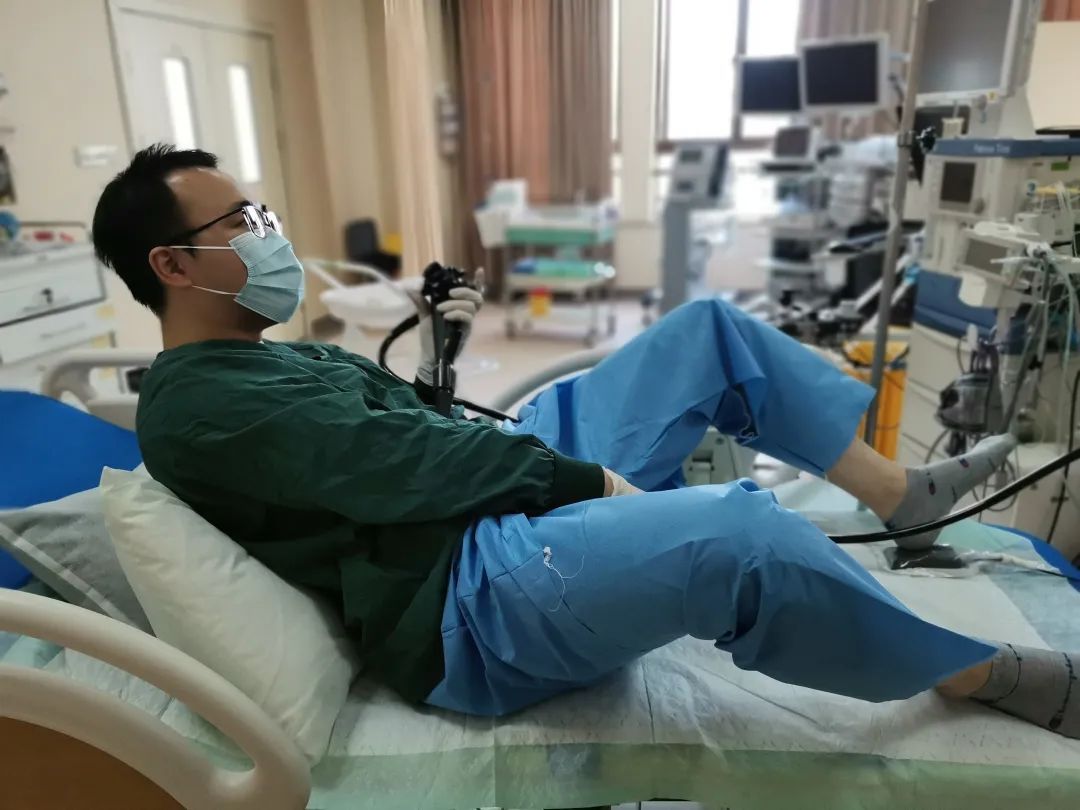內容目錄
Source: Zhejiang Hospital

You read that right! In this photo, the young doctor himself performs a colonoscopy. Recently, Chen Lipeng, a gastroenterologist at Zhejiang Hospital, did something that ordinary people thought was a bit “crazy”.
As long as you are mentally prepared, colonoscopy may not be so painful
“Because I have a family history of colon polyps (adenoma), and I have some abdominal discomfort recently, have you ever done a gastroscope? There is a problem, so I plan to do a check on my own intestines.” Chen Lipeng said, “Although colonoscopy is very common now, many patients are always worried before doing it, and some people will be afraid. This attempt will not only give me personal experience, but also know how to improve in my future work!”
When doing colonoscopy for himself, Chen Lipeng chose the sitting position at that time, because he usually does it for patients. The body position is different, and I am a little unaccustomed to the manipulation at first, but I gradually found the feeling and adjusted the body position according to my left and right. It took about 6 minutes to enter the mirror and reach the ileocecal area. I felt a little abdominal distension, but no pain. relatively smooth.
“At the beginning, I will definitely be nervous, worried about whether I can successfully complete the examination and whether there will be obvious abdominal pain during the examination. When I actually started the operation, my whole body calmed down and I focused on the operation. I felt pretty good overall, and I plan to make another colonoscopy appointment with myself in 3-5 years.” He said easily after the colonoscopy.
Through this experience, he would like to tell everyone that although there will be a certain degree of discomfort in doing a normal gastro-colonoscopy, as long as you are mentally prepared and cooperate with the medical and nursing examinations, there is no need for a colonoscopy. As painful as imagined.
Why colonoscopy?
Zheng Peifen, director of the Department of Gastroenterology, Zhejiang Hospital, said that colonoscopy is mainly used to observe all colon and rectal lesions from the anus to the ileocecal valve. If there are inflammatory lesions or polyps, adenomas, cancers and other lesions in the colon or rectum, the lesions can be clearly observed during colonoscopy, and a biopsy can be taken when the mucosal lesions are directly viewed and sent for pathological examination. With the continuous improvement of colonoscopy technology, the observation of lesions has gradually increased pigment control and enlarged observation, which can effectively improve the detection rate of early-stage tumors.
If the following symptoms occur, colonoscopy is required.
1. Lower gastrointestinal bleeding of unknown cause.
2. Chronic diarrhea of unknown cause.
3. Unexplained middle and lower abdominal pain, abdominal mass, and unexplained low intestinal obstruction.
4. Suspected benign or malignant colon tumor, which cannot be diagnosed by imaging examination.
5. Suspected chronic intestinal inflammatory disease.
6. The barium enema was found to be abnormal, and the nature and scope of the lesions should be further clarified.
7. Determining the lesion range before colon cancer surgery, re-examination and curative effect follow-up after colon cancer and polyps.
8. Special recommendations: Colonoscopy should be performed for people over 45 years old, and colonoscopy should be performed after the age of 35 for patients with family history, so as to effectively prevent intestinal diseases, early screening, early treatment.
Why are you afraid of having a colonoscopy?

Fear often stems from the unknown. Humans are always full of fear of the unknown. To eliminate this fear, we To fully understand things.
Chen Lipeng said that psychological fear is one of the reasons for the rejection and fear of colonoscopy. For example, some older people will say that my constitution cannot tolerate it, so I can’t have a colonoscopy. In fact, there is no such thing as a “tolerance constitution” for colonoscopy in medicine. The main reason for the patient’s severe discomfort experience is that the ideological burden is too heavy. Only by overcoming the psychological barrier and actively cooperating with the doctor’s treatment can the discomfort experience be minimized.
How to relieve the psychological fear before colonoscopy?
Patients can perform breathing relaxation training under the guidance of professional psychologists and spiritual care teachers, similar to prenatal breathing training. It is helpful for patients to cooperate with doctors to complete colonoscopy more quickly and with less pain. There are many relaxation breathing methods, generally consider using deep inhalation slowly for three counts and then rapid exhalation, and so on, until the inspection is completed. The methods used by different patients need to be guided and trained by professionals according to their specific conditions.
In addition to doing psychological well, what preparations should be done for colonoscopy?
Evaluation preparation: Before making an appointment for colonoscopy, a series of examinations, such as blood routine, coagulation function, four immune tests, and nucleic acid testing are required to evaluate the patient’s physical condition at that time, whether Surgery was tolerated, and electrocardiography was also included.
Bowel preparation: Includes both dietary preparation and bowel preparation.
Diet Preparation: At least 24 hours of a residue-free diet. For patients with constipation, a 3-day residue-free diet is generally recommended. A residue-free diet mainly refers to the consumption of easily digestible foods that do not contain high-fiber foods such as vegetables and fruits.
Bowel preparation: The bowel needs to be cleaned before the colonoscopy, 4-6 hours before the colonoscopy, take polyethylene glycol electrolyte powder solution to clean the bowel road.